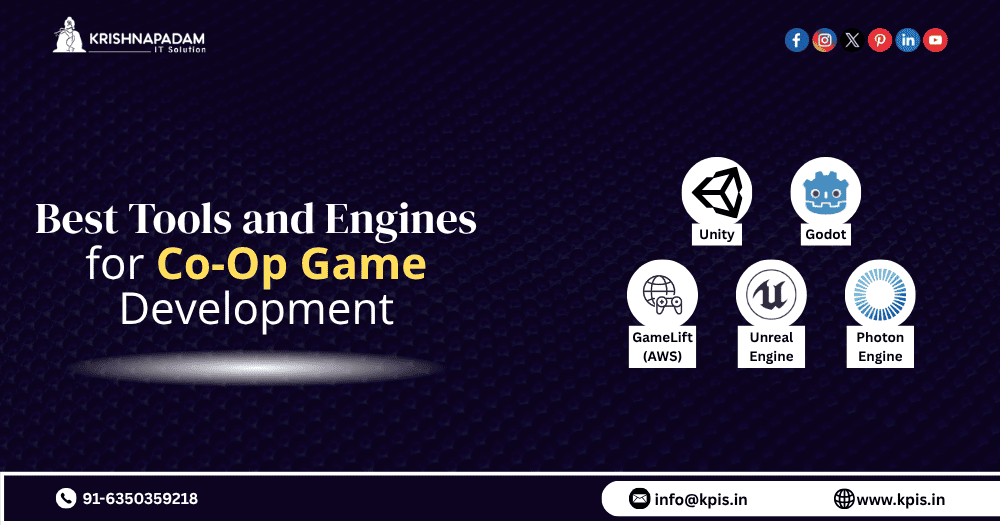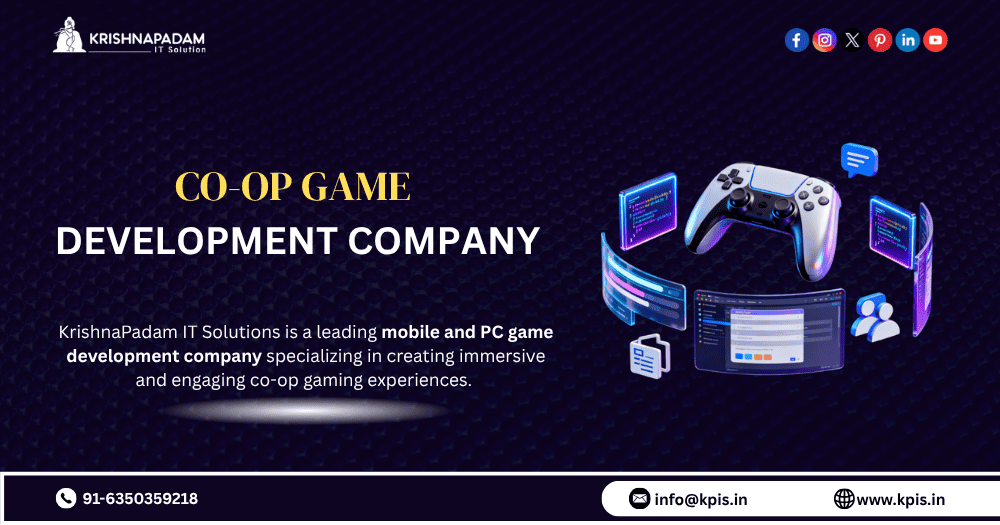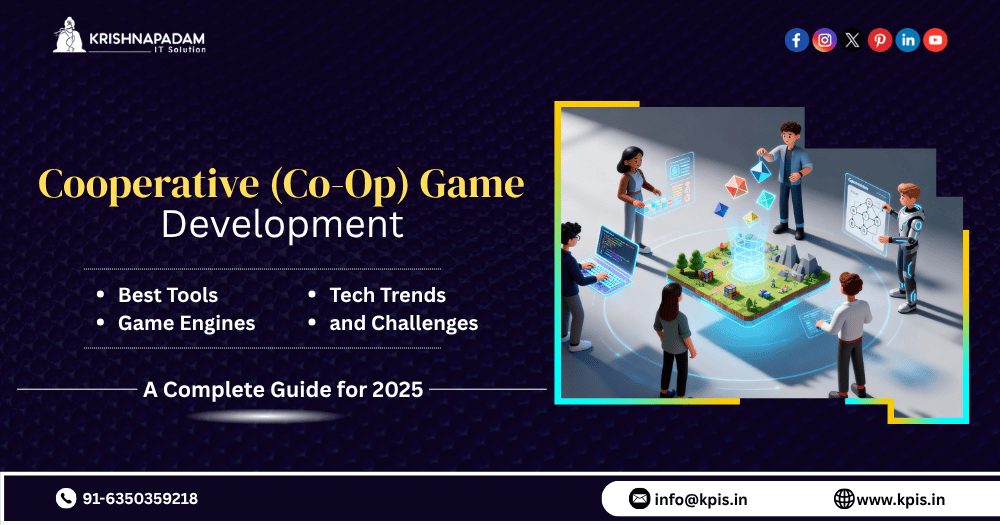Did you know that over 50% of gamers today prefer playing co-op multiplayer games over solo experiences? Whether it’s teaming up with friends in action-packed adventures, strategizing together in real-time strategy games, or solving puzzles in co-op challenges, multiplayer gaming is more popular than ever. Read this article to know more about multiplayer cooperative (Co-Op) game development- a complete guide for 2026 including best tools, engines, tech trends, and challenges.
Cooperative (Co-Op) games have captured the gaming landscape by adding a unique flavor of social interaction and excitement that players are looking for. Whether through connected and online multiplayer experiences, or in a couch co-op experience, these games provide a deep sense of social interaction and create connections between players in virtual worlds. Moreover, developing a Co-Op game has specific challenges, opportunities, and technological trends that are changing the way we experience this genre.
What Is Co-Op Game Development?
Before we jump into the tools and technicalities, it’s worth understanding what sets co-op games apart from other genres. Co-op games are those where players work together toward a shared goal, rather than competing against each other. These games can be either online or local multiplayer, and the focus is often on teamwork, strategy, and collaboration. Popular examples include:
- It Takes Two- an award-winning narrative co-op masterpiece.
- Left 4 Dead 2- intense teamwork-driven survival.
- Phasmophobia- a perfect blend of horror and cooperation.
- Minecraft Realms- a sandbox where imagination thrives collectively.
Co-op mechanics come in various forms, from simple tasks such as solving puzzles together, to complex team-based coordination for high-stakes combat. The essence of the co-op experience is the need for an ability to communicate, delegate roles and discovering solutions to problems together, which represents a large part of the modern gaming space. Rising to prominence in recent years, innovative co-op experiences are becoming prevalent wherever user-experience involves cooperation.
Best Tools and Engines for multiplayer Co-Op Game Development
Creating a co-op game is an exercise in both creativity as well as the appropriate technical tools. Multiplayer games present each unique challenges, including the quality of play between players, synchronization, and cross-platform play. This requires robust game engines that can support the demands of game development, and the necessary dev tools/frameworks that especially support co-op game development. Here’s a quick reference list of some of the best tools and engines for co-op game development:

Unity
Unity is one of the most popular game engines for indie and AAA developers alike. Known for its versatility and extensive support for 2D and 3D games, Unity offers powerful multiplayer and networking capabilities through the Mirror or Photon networking libraries, making it ideal for co-op game development.
Pros:
- Strong community and vast documentation.
- Asset Store for pre-built multiplayer assets.
- Cross-platform support (PC, consoles, mobile, VR/AR).
Use Case: Perfect for both simple and complex co-op games, from local split-screen experiences to large-scale online multiplayer games.
Unreal Engine
Unreal Engine (UE) is a powerful, high-performance engine that is more often than not the engine of choice for developing beautiful games. UE comes with several tools for building multiplayer games, and provides an elevated experience of coordination through its Networking Framework, which can assist and simplify the process for synchronizing players, data, game worlds, and other assets across multiple devices.
Pros:
- Cutting-edge visual and physics engine.
- Integrated easy-to-use multiplayer options such as replication-basic multiplayer.
- Excellent use of blueprint scripting for creating and testing content in-game quickly.
Use Case: Best for developers looking to create graphically intensive co-op games with complex environments, such as action-packed shooters or large open-world games.
Godot
Godot is a free, open-source game engine that’s gaining popularity due to its simplicity and flexibility. While it might not have the same level of high-end visual fidelity as Unity or Unreal, Godot is an excellent choice for 2D and 3D co-op games, especially if you’re working on a smaller project or need full control over your game’s code.
Pros:
- Lightweight and easy to use.
- Supports both 2D and 3D co-op games.
- Visual scripting and GDScript (similar to Python) for building quicker.
Use Case: Perfect for independent, smaller, co-op games and those interested in an open-source solution to develop a 2D game or a more simple 3D co-op game.
Photon Engine
Photon is a common multiplayer optimized game SDK and cloud-based network solution that can be utilized with previous engines to manage matchmaking, synchronize, and provide multiplayer capabilities.
Pros:
- Highly optimized for real-time multiplayer games.
- Easy to manage connection (matchmaking, room making).
- Works across platforms (mobile, PC, consoles).
Use Case: Ideal for developers looking to deploy a dedicated, easy to implement networking service for fast and scalable experiences for multiplayer games..
GameLift (AWS)
Amazon GameLift is a dedicated server-hosting service that helps developers deploy multiplayer servers and manage game sessions. It’s particularly beneficial for large-scale co-op games requiring persistent world states or real-time player interactions.
Pros:
- Scalable server infrastructure for large co-op games.
- Includes matchmaking and server management.
- Integrates with AWS services for storage of data & management of players.
Use Case: Best used for large, online co-op games that require a scalable and reliable server infrastructure.
Tech Trends in Co-Op Game Development
Co-op game development is fast-evolving with new technologies to improve gameplay and enhance player experience. From making more enjoyable multiplayer experiences, to interactive environments in games, there are various technology trends transforming the way co-op games are developed and played. Some of the trends are:
- Cloud Gaming: Platforms like Google Stadia and Xbox Cloud Gaming let players enjoy co-op games without needing powerful hardware. Developers are using cloud servers for smoother multiplayer experiences.
- Cross-Platform Play: More games are allowing players from different devices (PC, console, mobile) to play together, making it easier to team up with friends.
- AI & Dynamic Difficulty: Advanced AI makes NPCs smarter, and games adjust difficulty based on player skill, offering a fair challenge for all co-op players.
- VR & AR: Technology is adding unique player perspective, allowing players to interact with one another in a world, instead of only as a user on a screen, as they do in VRChat or Rec Room.
- Procedural Generation: Games like No Man’s Sky, develop co-op play in endless worlds as the worlds are generated randomly and endlessly through procedural generation.
Key Considerations for Multiplayer Co-Op Game Development
When creating a co-op game, several key factors ensure the experience is engaging, fun, and rewarding for players. Here are the most important considerations:
- Clear Objectives- Make sure players understand what they’re working toward as a team. Clear objectives ensure the team stays focused and engaged.
- Balanced Gameplay- Adjust difficulty based on the number of players and their skill levels to maintain challenge without frustration.
- Strong Communication- Provide players with access to simple communication methods, whether this is through voice chat, ping systems, or simple messages or communication methods to help promote cooperative objectives.
- Diverse Roles- Develop unique roles or abilities for players to create interdependence and facilitate collaborative play.
- Effortless Inclusivity- Create a game that allows players to join smoothly from anywhere whether that is in the same room, switching to another role, or drop in and out.
- Reliable Online Connectivity- Make sure there are no rifts in gameplay caused by lag or connection disruptions when playing online.
- Meaningful Re-playability- Create variety, random options or paradigms that allow for naturally unique experiences to emerge with successive playthroughs.
- Customizable Accessibility- Create difficulty, control and setting customizations so that any player may participate.
Why Work with a Co-op Game Development Company?
Creating a co-op game necessitates a different perspective. Many game development companies design single-player experiences or competitive multiplayer experiences with similar design approaches; however, many co-op experiences require:
- Incredibly Robust and Adaptive AI: Similar to the requirement of AI controlled characters in a single-player game, however good AI needs to adapt to the different strategies of individual players.
- Network Infrastructure: A robust, low-latency multiplayer network architecture is essential for smooth online co-op experiences.
- Balance and Design: Game mechanics must be carefully balanced to ensure that all players contribute meaningfully and that the game remains engaging throughout.
- User Experience: The social and collaborative aspects of co-op games must be emphasized, which often requires detailed attention to interface, accessibility, and communication systems.
Leading multiplayer Co-Op Game Development Company: KrishnaPadam IT Solution

If you’re looking to create an unforgettable multiplayer co-op gaming experience, and want to know more details about multiplayer cooperative (Co-Op) game Development- A Complete Guide for 2026, KrishnaPadam IT Solution is a leading mobile and PC game development company specializing in creating immersive and engaging co-op gaming experiences. We put a strong focus on multiplayer mechanics, and we design and develop co-op games for collaboration, teamwork, and fun.
Our developers are proficient in the most needed game development tools and technologies, including Unity, Unreal Engine, Godot, Photon Engine, and others; therefore, your game will be built with the best technology available. Our developers will help you realize your vision regardless if you are developing a small indie game or AAA title.
Conclusion
Creating Co-Op games is an exhilarating experience filled with challenges and immense benefits. With the rapid change in technology and trends like cloud games, cross-play, Artificial Intelligence powered NPCs, and VR shaping the future of CO-OP games, there are always things to keep in mind when developing Co-Op video game experiences game balance, enjoyable player dynamics, and seamless multiplayer.
Do you get excited about developing a Co-Op game that players will love? KrishnaPadam IT Solution can help make your thoughts come to life. Hire our talented game developers today to create the next best multiplayer game! Reach out now to know more about multiplayer cooperative (Co-Op) game development- a complete guide for 2026 and speak about your next project and take the first step in building the best experience you can for the competitive gaming culture.

